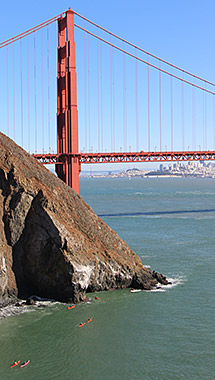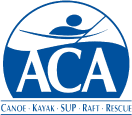
The following is a general statement of BASK policy/philosophy regarding sea kayaking trips and safety. Before embarking on a trip, also check the list of specific skills important for paddling in certain areas (such as the open Bay, exposed coast, etc). It also covers some safety rules that are required for the BASK liability and accident insurance policies.
Our intent is not to dictate a set of rules or to tell anyone how or where they should paddle. The purpose is to inform new BASK members, and remind all members, of the way BASK trips function and of what we consider to be a relatively safe way to sea kayak, based on a considerable amount of past experience. This is open to review and revision; if anyone has any better ideas, please make them known (contact the BASK Safety & Education Lead).
We do not discuss group dynamics here. Decisions regarding teamwork, group formations, signals, etc. must be tailored to each trip and will be made by group consensus or by the trip initiator. Our goal is to function as safely as possible. However, be advised that risk cannot be entirely eliminated when paddling a kayak.
Personal Responsibility
- On any BASK trip, each and every participant is responsible for his/her own safety. Use your own judgment. Never blindly follow anyone into a situation you are unsure about.
- Be prepared to take care of yourself. This does not mean that the other members of the group won't assist anyone who needs it; but such assistance should never be taken for granted, especially in difficult conditions. Be aware that, despite all good intentions, there is always a real possibility of being separated from the group.
- Be sure your skills are adequate for any given trip. There is nothing wrong with bailing out at the put-in; everyone has done it.
- It is up to each and every participant to know the trip agenda. Use a map or chart, carry a compass, and consult with the trip initiator if you are not familiar with the area. Approach the trip as if you were planning it. Trip initiators have been known to screw up or bail at the put-in; don't be over-reliant on them.
- Assume that benign conditions will deteriorate and be prepared for the worst possible scenario. Also be prepared to take advantage of conditions that turn out to be better than expected.
- Make sure you have the appropriate equipment for the trip. To meet US Coast Guard requirements, all paddlers must have a whistle and a well-fitted U.S. Coast Guard-approved life jacket in good condition with no tears or holes. In cold water, wear a wetsuit or drysuit. Always wear a helmet in surf and ocean rock gardens. Check to be sure your kayak and other equipment is fully functional and in good repair.
- In case of an emergency requiring urgent rescue or medical assistance, paddlers should issue a distress call on a VHF radio on channel 16 and/or call 911 from a cell phone.
- In order to be covered by our liability insurance, participants cannot use alcohol or other mind-altering drugs prior to and during a paddling event.
- Paddlers must adhere to all current U.S. Coast Guard regulations for inland and coastal waterways.
Trip Initiators
- The trip initiator is the trip organizer, not a tour guide. Commercial outfitters get paid to be responsible for their customer's safety. BASK is a club, not an outfitter, and does cooperative, not guided, trips. Trip initiators are no more responsible for the safety of others than anyone else in the group. Everyone has to paddle their own craft; a "leader" can't do it for them.
- Trip initiators are not responsible for evaluating participants' kayaking abilities. However, they have the right to eliminate anyone who is not prepared. Participants should evaluate their own skills. Try to be realistic; it might save embarrassment later when you become the subject of a safety talk.
- The trip initiator can organize (or not organize) the trip in any way he or she wants. Feel free to talk to the initiator beforehand to find out how the trip is to be structured. If you don't like the way a trip is organized, initiate your own trip and do it your way.

